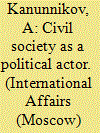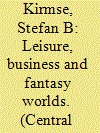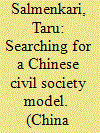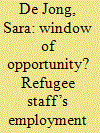| Srl | Item |
| 1 |
ID:
181358


|
|
|
|
|
| Summary/Abstract |
THE PARTICIPATION of civil society in the politics of various countries is receiving increasing scholarly attention. Two clashing opinions regarding the place and role of civil society in today's world stand out in works written on this subject. Some researchers believe that civil society organizations should stay out of politics, while others insist that involving all civil society groups in the political process is vital to obtaining unique and accurate information necessary for political decision-making. Moreover, in European Union countries, for instance, persistent efforts have been made in recent years to improve governance mechanisms by drawing civil society into this integration organization at various levels [2].
|
|
|
|
|
|
|
|
|
|
|
|
|
|
|
|
| 2 |
ID:
103135


|
|
|
|
|
| Publication |
2009.
|
| Summary/Abstract |
This article explores the participation of university students in non-governmental organizations (NGOs) and other forms of association in the city of Osh, Kyrgyzstan. While the literature tends to criticize donor interventions in the post-Soviet space, an analysis of donor-funded youth projects calls for a more differentiated evaluation. It is argued that youth-oriented associations appeal to the students of Osh because these associations have created much needed 'youth spaces'. In some cases, however, the appeal has little to do with the missions of the projects. Whatever the blueprints prepared by foreign donors, youth-oriented clubs and NGOs provide young people with opportunities for entrepreneurship, for leisure pursuits and for experimenting with their dreams and fantasies. Offering a case study of a group of students who have joined a donor-funded NGO, Students in Free Enterprise (SIFE), the article then charts the students' appropriation of this NGO.
|
|
|
|
|
|
|
|
|
|
|
|
|
|
|
|
| 3 |
ID:
085319


|
|
|
|
|
| Publication |
2008.
|
| Summary/Abstract |
This study hypothesizes that the Chinese state uses NGOs as objects of consultation for improving its policymaking in the same way it consults mass organizations, democratic parties, and official professional associations to obtain specialist information. This model of consultation is based on the mass-line model and on its application within democratic centralist administrative hierarchies. The investigation shows that, apart from their main social or environmental tasks, Chinese NGOs indeed inform the state, many of them with policy formulation in mind. It also shows that the Chinese state uses democratic centralist vocabulary to describe the tasks that it assumes NGOs should undertake. However, apart from the mass-line type of consultation, both NGOs and the state have other conceptions about the proper roles for NGOs. The state now promotes the idea of civil society as an independent service provider, while NGOs seek an even larger sphere of social autonomy and self-organization.
|
|
|
|
|
|
|
|
|
|
|
|
|
|
|
|
| 4 |
ID:
165700


|
|
|
|
|
| Summary/Abstract |
This article presents an analysis of employment trajectories of refugee staff in migrant support and advocacy organisations in the UK, Austria and the Netherlands. In contrast to existing scholarship, it takes refugees’ success in finding employment as a starting point. Moreover, it makes an important contribution to extant literature by identifying the unique features of a niche employment sector for refugees: migrant support organisations. I demonstrate that the mainstream explanatory concepts of ‘labour market segmentation’ and ‘ethnic niche’ fail to capture refugees’ pathway from client to service provider and neglect the sector’s status as a mid- to high-skilled but feminised employment sector. I propose instead to understand ‘refugeeness’ as a form of capital and argue that this capital provides access to employment in migrant support and advocacy organisations, while simultaneously trapping refugees in front-line work with high degrees of hidden, devalued labour and inadequate career mobility.
|
|
|
|
|
|
|
|
|
|
|
|
|
|
|
|